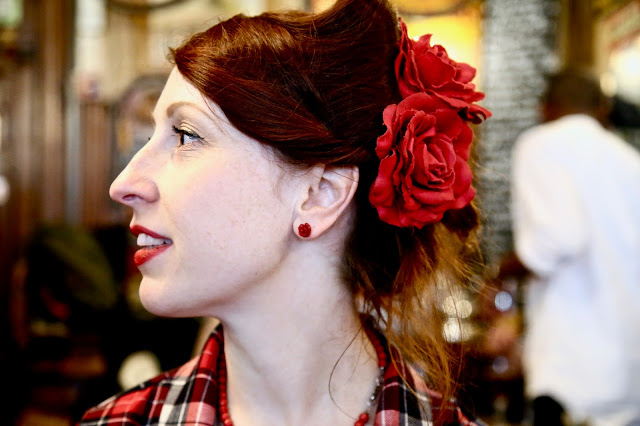
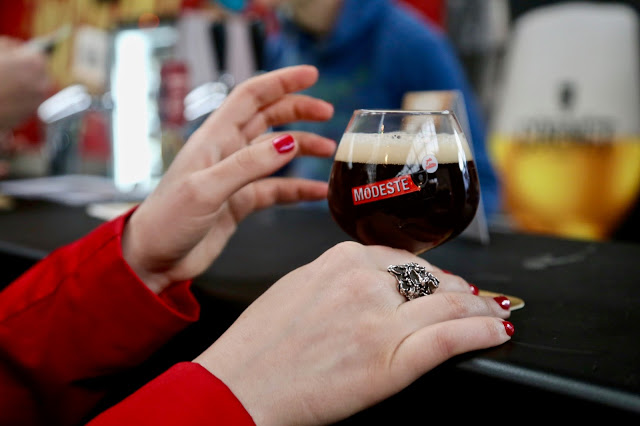
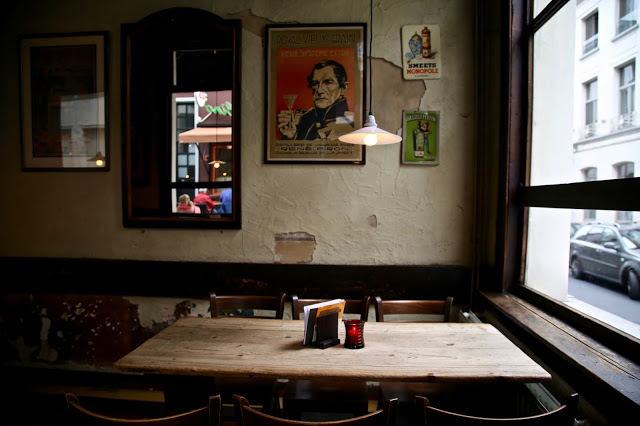
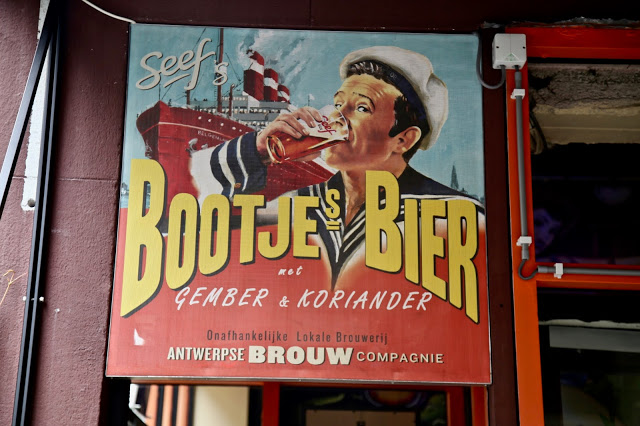
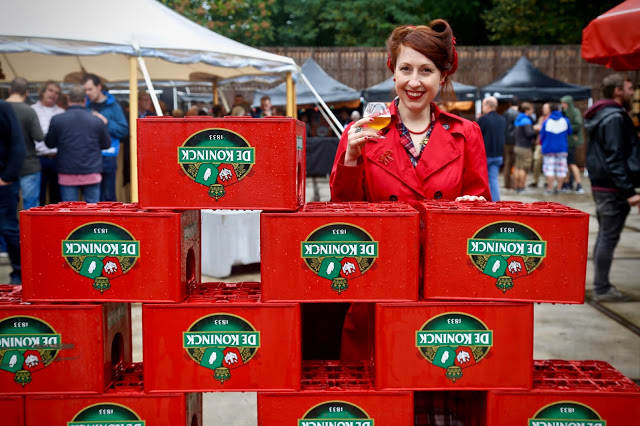
She looks like a children’s book character, drawn perhaps by Ronald Searle; a Flemish Mary Poppins, a tiny waist, auburn hair piled up in ornate pin curls, red flowers clipped in.
‘Hook in!’ she cries, proferring a red-coated elbow, the hand at the end of the sleeve holding aloft a tall frilly umbrella.
We link arms as we cross the rainy main square in Antwerp. There’s the grand station at one end, the central zoo next door, heralded by a copper boy on a verdigris camel. As we stride, petticoats swirl and brush the full skirted tartan dress, her lips cherry red against pale skin. Regula Ysewijn gets up at 4am every day to coif her metre-long hair, which has never been cut.
She admits to being a little bit OCD, using consecutively her mobile phone, the umbrella handle or that sharp elbow to press lift buttons or open doors.
‘I like things clean. I’m a bit strange,’ she explains in her Flemish accented English with slightly anomalous cockney glottal stops.
‘I usually carry anti-microbial gel. I’m such a busy bee. I know life is short.’
Regula is organised and energetic. At the moment she is simply glowing – her career has taken off. Her first book ‘Pride and Pudding’ was a triumphant success, winning Radio 4’s The Food Programme’s best cookbook of 2016. Her second book ‘Belgian Café Culture’ came out in Belgium and the UK simultaneously. She has also been chosen to be a judge on the Belgian version of Bake Off.
Following her around Antwerp, I see people do double takes ‘is that…?’. She’s becoming famous.
Today she is taking me to visit a small festival called appropriately The ‘Modeste’ Beer Festival, which showcases craft beer companies from Belgium. At the entrance we pay three euros for a glass, and at each stall we pay a euro for refills. People are pleased to see Regula, they hug her. The men are thrilled that a woman knows her beer. We walk around the festival, sipping beers, while Regula tells me stories.
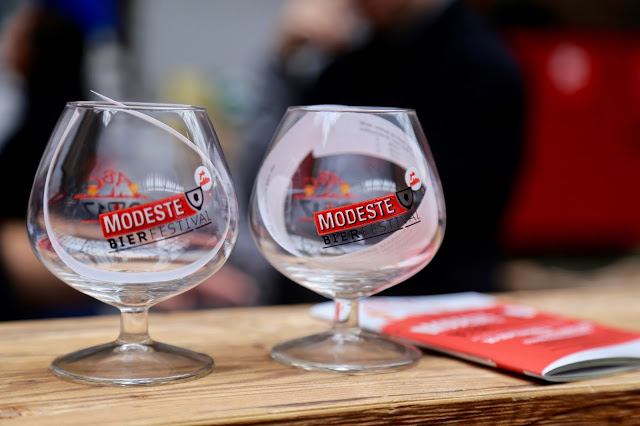
I like the heritage of beer; it’s such a big part of our history. If we didn’t have any beer, we would have died. We wouldn’t be here anymore. Beer kept us alive.
The whole misconception is that people drank beer rather than water, because the water wasn’t clean enough, some part of that is true. The main reason was that it gave much needed sugar and calories. Children drank beer.
It’s the most beautiful, natural drink in the world. I’m extremely proud of that. It makes me proud to be Belgian or Flemish.
There are 2 types of beer that are incredibly special to Belgium, which can’t be reproduced anywhere else in the world – our Lambic and our Gueuze beer.
These are made with spontaneous fermentation and can only be made in the Zenne valley because of the specific bugs in the air, a certain bacteria. It is purely terroir. It is more like a wine than a beer. It tastes like certain natural wines.
Like a sourdough mother?
Yes. You don’t often see Lambic out of the brewery.
We have this process of ‘cutting’ the beer – Gueuze is basically a blend. We call it ‘cutting’, but it’s blending a young lambic and and an aged lambic. Those two mixed then fermented a little bit more in the bottle, becomes Gueuze beer. It’s more approachable than Lambic beer.
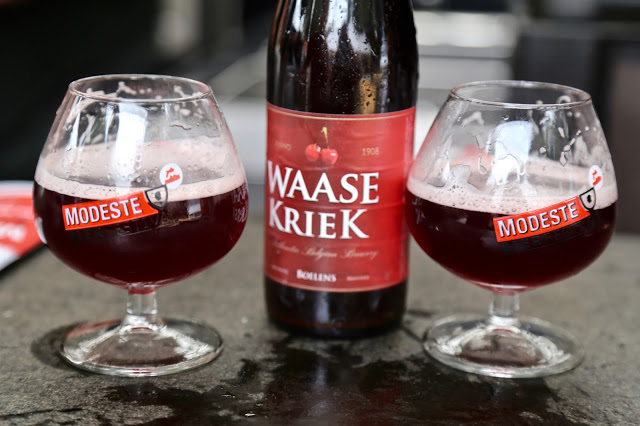
They also make a heritage cherry beer, Kriek. It’s not like cherry beer in the UK, which is sweet. This is sour, tangy, tastes like the kernel of the cherry, bitter almonds. It’s made by chucking in whole cherries in the last fermentation. No sugar involved.
In commercial Kriek beer, there are added sugars, adding cherry juice not actual cherries. They also make it with plums.
Do you prefer beer or wine?
Beer is cheaper. My husband and I prefer to share a bottle of beer for our dinner. We prefer to have one bottle, then perhaps open another. Our beer is stronger.
People in the UK are made for drinking a lot of liquid. If I meet UK drinkers they always say, when are you finishing our beer? I drink slowly.

Do you have your favourites at this festival?
I have to say hi to the man who made my beer – Zageman or ‘Sawman’ beer featured in my book ‘Belgian Café Culture’. Another beer I like is Flemish red, a beer that was created in Belgium to mimic English Porter ales. It’s from the west of our country, named after Rodenbach, who was a poet in West Flanders. It’s also made by cutting a young and old beer, with spontaneous fermentation. But this is sour but sweet, while Lambic is sour and bitter. This is my favourite beer, but it has an old-fashioned reputation. When I was travelling around working on my book and drinking, when I asked for Rodenbach, they’d say ‘you are so young to order that!’.
It’s very special. I want to make sure this beer is kept (as part of our heritage). Each beer has its glass. Rodenbach had a rebrand in the 1990s. This is a balloon glass with a narrow neck. Before it was a straight-sided glass for Rodenbach.
We don’t do pints in Belgium. This is a regular Rodenbach. It’s really smooth; they usually have a grand cru too.
We sip. Regula notes expertly as we taste…
Sour, interesting, complex, dark, glowing colour. Smooth. Fruity, malty, caramel, no added sugars. It’s brewed and put into wooden barrels that are standing a bit tilted, so the air can get in. You can get lacto-fermentation.
You can’t compare this to a hoppy beer. This is heritage beer: much older. You would go to the seaside and drink Rodenbach with a free bowl of grey shrimp.
There is one cafe in Antwerp that still does this, but only in October. The prawns are not peeled you have to peel them yourself, the cats are happy to get the shells. I last went there in February which is crazy because I try to visit them regularly.
Yes, I do feel that responsibility, and to keep the cafes going. That’s why I did my book. I like to keep track of them. I told them all: ‘If something is going wrong with your café, let me know’. If there is a problem, contact me, so I can try to do something. We have to make sure that no more cafés disappear.
A lot of them are disappearing?
Yes, sadly.
What are they being turned into?
Burgers bars, hipster hangouts, sometimes just flats. Quintessentially a Belgian cafe is a living room cafe. It’s a female job. They are often started in someone’s front room. It’s like a supper club. They feel like homes.
There are different cafés in Belgium of course, like the big Grand Cafés, which have nearly all disappeared. Cafés around the fin de siècle.
Yes. Landladies are retiring, Children don’t want to take over. They often just get turned back into houses. They often don’t look like cafés. My dad went with me on my café tour. And we were looking for a café, but the sign had already gone from the facade, you didn’t even know which house was the café. The neighbours said: ‘Oh just go in, just push that front door’. It was like a normal front door. And behind it was a café. The only thing you could hear was the ticking of the clock. And there was no one there. It was really warm. It looked like someone had just left. There was that kind of ambiance. No empty glasses. It felt like someone had just got up and left. So we were like: Hello? Hello? Helloooo? A lady came, who was really old, like 96,97. Really old. The oldest café landlady in Belgium. She just got a glass, got a pint, filled it up.
I believe that having a café keeps you young. It’s like making a pact with the devil. All those café landladies look beautiful. They are all old women but they have this glow, because they are so loved, the kind of love that they are surrounded with in the community, makes them beautiful. They are queens of their community. There are a couple of landladies that I visited, and they told me that their birthdays turned into village fetes. Everyone would come, people would bring stuff, and they’d create this whole feast because the landlady was like everyone’s grandmother.
It is easier. I haven’t seen any hard liquor. They just do beer. It’s alright. They have this kind of deal because they are so old, they can continue.
No, I think I’d have to get a license. I think it’s quite easy though. I know from Eastenders that you have to have a licence and get an education.
No. They are open, very traditional village ones, or the ones that are close to a factory, from 6 in the morning, closing around 9 or 10. Open again at lunchtime. Then again in the evening at 5pm until 8 and then they close.
People going to work, coming home from work?
Yes.
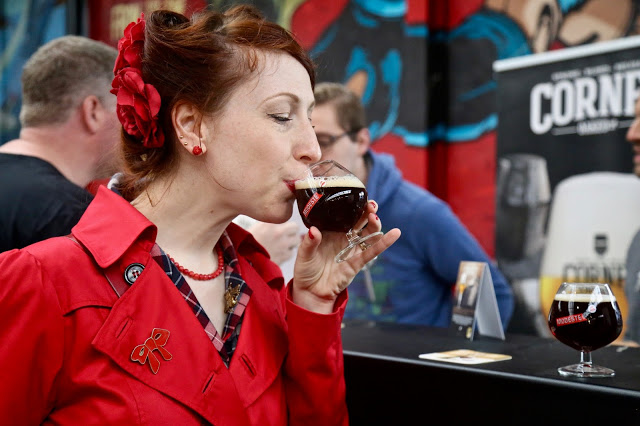
With cheese you’d start with the mildest. How do you taste these beers? Is there an order?
In beer you’d start with the sours.
You can’t start with the hoppy ones.
We taste another beer, Liefmans, ‘Golden ribbon’, which is darker, creamy, more like Guinness or Pelforth Brune. We share a glass as neither of us wants to get too drunk. I watch the barman slice off the foam with a knife.
Just smell it.
A lot of sweetness, very malty. Horlicks almost. It’s like gravy.
Only one beer like this. New beer cut with brown beer. Very close to older type of beer, sour. They become better and better, that’s why they use Champagne corks. You can keep them for years like good wines. Some Trappist beers are 20 years old.
This is also one of my favourites: but I feel like it’s changed.
It’s now owned by Duval, which is a big brewery buying up other breweries. They also own De Koninck. They are magnates.
It’s a very good beer, but it’s an everyday beer.
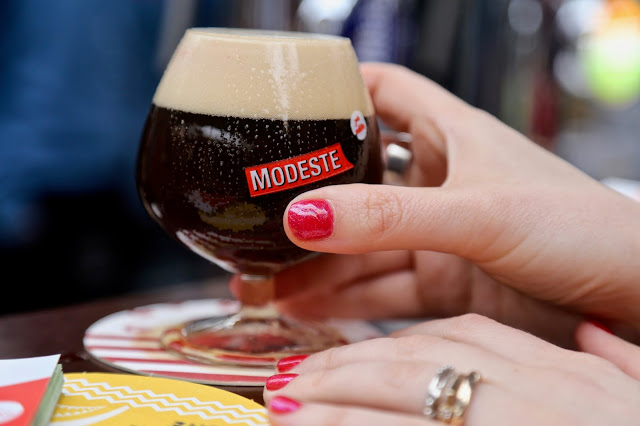
Harbour cafes do food – home cooked things like bangers and mash. In the harbour of Antwerp, workers would wait until the foremen came in and say ‘I need 5 guys’. If they don’t get a job, they stay in the cafe, otherwise their wives will be angry.
There’s one left. In Antwerp, it’s called ‘Diner’ – well, not exactly, but that’s the nearest translation. It has long benches. But as the port of Antwerp moved more and more out of the city, all those cafes disappeared, only a couple left.
You don’t really enter them but I did. I nearly got my face smashed in. It was a real harbour cafe with dock workers, they have a waiting room across the street. They created this so people don’t drink up their pay. But if they don’t get a job they go across to the café cos they don’t want their wives to know they don’t have any work that day.
So I went in there. The first question I got was not ‘What do you want to drink?’ but ‘What are you doing here?’.
There were pretty girls behind the counter and a bunch of dockworkers around but the conversation stopped, the moment I walked in. This is not a place that women come. This is a man’s place. There are no women in dock workers cafés because all the men have a wife. It’s not considered proper that a woman would be in there, like a prostitute or something.They are all working fathers and husbands. If you are someone’s wife, someone’s girlfriend, then you are completely welcome but usually they don’t go there. If there are regular women coming in, the wives at home would be annoyed.
So I said ‘Who is the owner? I’m writing a book and I need to include this’. There was this Afghan guy who was managing the place, he said: ‘You can take photographs because a lot of the people here will not take it well.’
They are legal, they are all Belgian people. But there’s this atmosphere around dock workers. They are not criminal but they like to keep up that sort of appearance. A lot of them do have problems with the police. They do not want their pictures to turn up anywhere.
No female dockworkers, I assume?
There is one. They do not like her. Problem is she can’t take the work. It’s hard physically. So the others have to pick up the slack. They don’t dislike her personally but they don’t want to be in a crew with her. Because we have to work twice as hard. She thinks: ‘It’s my right, you can’t discriminate.’ If something drops. She will not be able to lift it.
I went in and I took a picture and it was against the light, so the people in the photo would be black. They were really cross with me, yelling at me. So I flipped a switch in my head and starting talking their language.
Listen men, I want to document your cafe. For my book about cafes. And they said: ‘You want to include our cafe?’
I explained: ‘I want real cafes. I want where people are attached to the café.’ He went, ‘Tell me about it’. He completely defrosted. Like ‘Wow you are respecting my gaff.’
I can tell you watch Eastenders. (Laughs.)
He’s used to people looking down on him, because he’s a dock worker. He’s considered the lowest of the low, historically. Many of the people working at the Antwerp docks, still today in Antwerp, generations have been working there.
I explained: ‘I am here to honour your place here.’ Ok, there was some dirty language.
I suddenly noticed there was a fish on the table. I asked why. The angry guy mellowed: ‘It’s my fish. It’s smoked trout. I smoked it. Another guy caught it, I smoked it.’ He was really proud. I could see his face change. He was not used to being considered as a person. He said: ‘Hey, do you want to taste my fish? ‘Hahaha,’ everyone laughed. He took the fish with his hands.
I wasn’t offended. I said: ‘Oh yeah I’ll have a taste.’ It was the best smoked fish I’ve ever tasted. It was really good, really natural. He was proud, and told me: ‘When it’s summer we are eating crabs, entire crabs here. In posh places they’d cost a lot.’ These people are living the real life. Not hipsters with their aeropresses. In crab season, the guy you know from around the corner, he’s got crabs. I spent the entire afternoon with them at the cafe. The second cafe I went to, even old café owners, asked me: ‘You went to Petra? You actually went in?’
Really, it is their defence mechanism. Their entire community is built around a lot of respect. They keep to themselves; they’ve suffered a lot of disrespect. They had a big demonstration in Antwerp a couple of years ago.The dock masters have changed the system, the workers can no longer choose who they will be in a crew with. It was a new law, put into practice so they could get more foreigners. The problem is, this is unsafe. They all know each other. They have each others’ backs. Every month or so, people die. The big containers they drop, they drop. They have eyes on each others back. If they are being put together with an immigrant who doesn’t speak the language, it’s dangerous. It’s nothing to do with racism, it’s dangerous.
There were fires in the street, vandalism. It wasn’t them, but it was blamed on the dock workers. They didn’t even consider that there were other people starting those fires. They are so disappointed by our society, that they keep to themselves. Me going in there, I became one of them. They have their own society: for instance, they just smoke in their cafe, they don’t give a fuck.
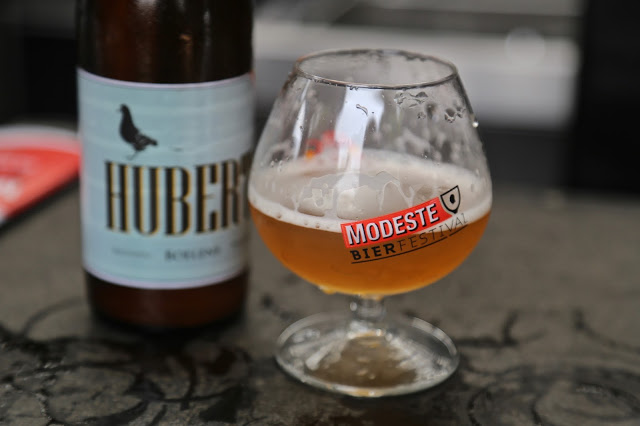
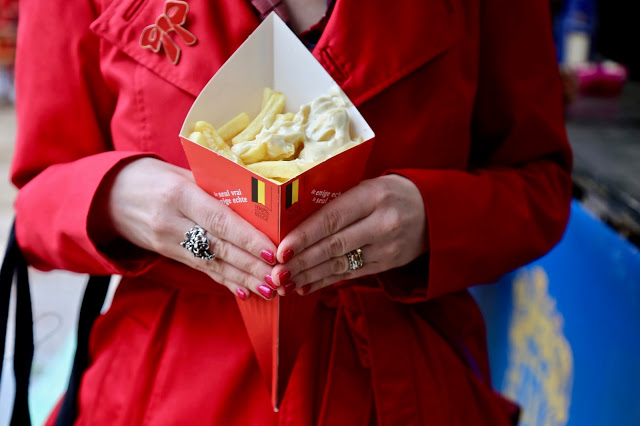
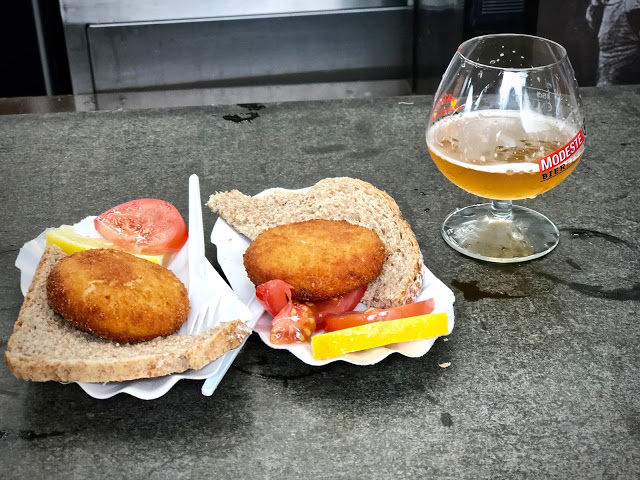
These tables used to be red. The owner he wanted this to be exactly as his father had it. They used to be marble so he got someone to paint them with a marble effect.
They all know me as the lady of the book. I did my launch here. My lady ‘Sawman’ is behind the bar.
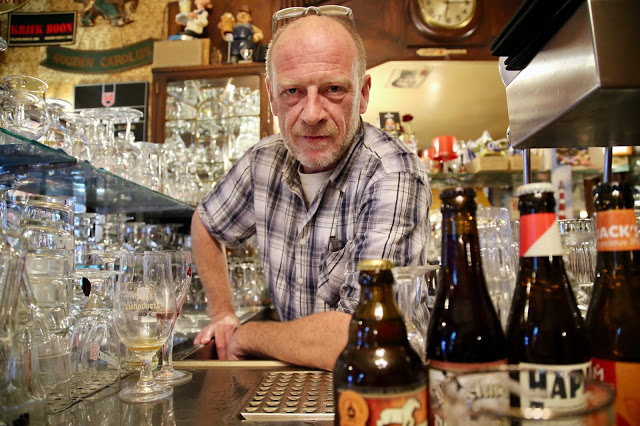
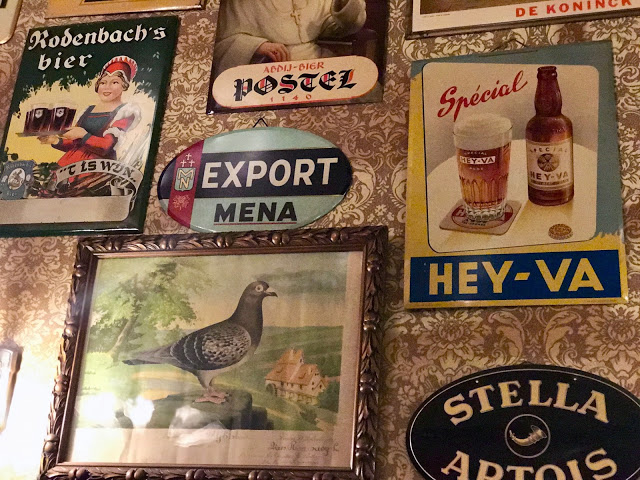
Regula and I are collaborating on a Flemish style supper club on December 6th, which is also ‘Sinterklaas’, the feast day of St. Nicholas, the historical basis for Santa Klaus.
Inspired by Breugel’s table, Regula’s knowledge of Flemish historical food, and my visits to Ghent and Antwerp, we will create a Belgian supper club with a twist.
Do book quickly as tickets are bound to be popular.
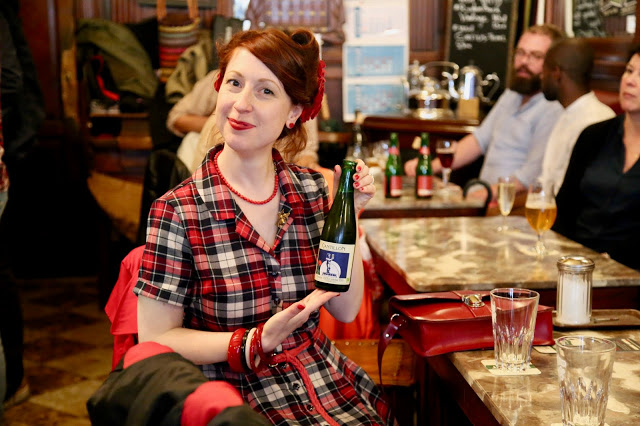
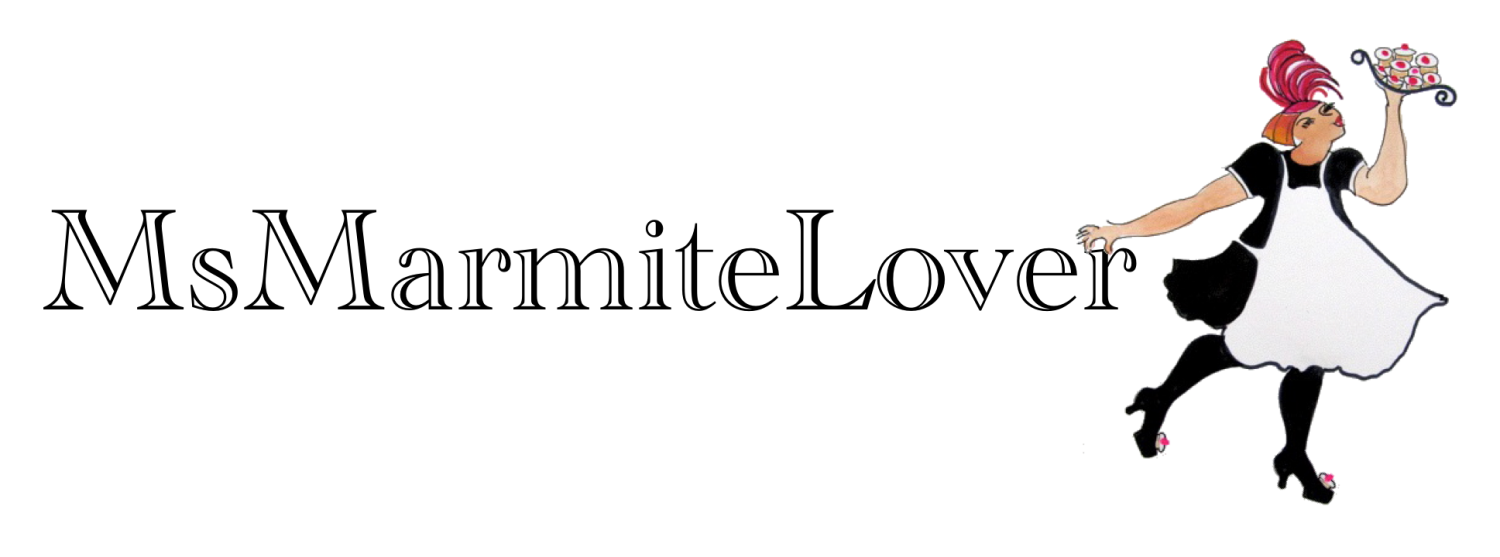



Very interesting post. Regula sounds like an interesting person. I'm sure your collaboration will be a huge success.
great post, reminds me of parts of Germany. Makes me wish I could drink beer!
Wonderful and interesting post. My interest is not just the beer but atmospheric traditional venues that have resisted gentrification and have something about them. I would be really grateful if you could please pop a few recommendations my way!